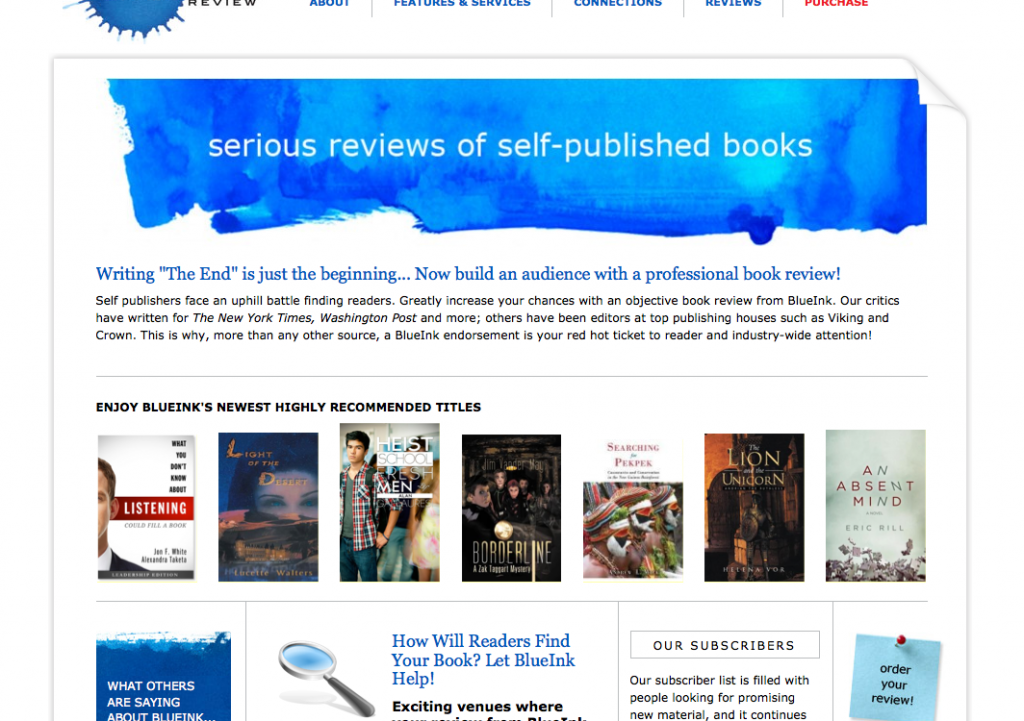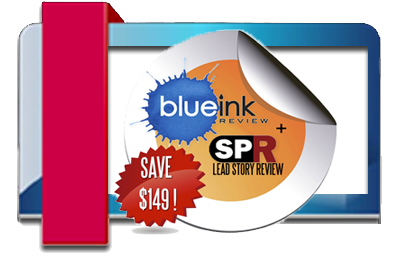In this interview, BlueInk Review founder Patty Moosbrugger gives advice and tips on how to make the best of a paid review service.

Patty Moosbrugger, BlueInk Review
Tell us about yourselves, and your roles at BlueInk Review
We both come from book backgrounds. Patti Thorn was the books editor at the Rocky Mountain News for 12 years before the newspaper went out of business. I worked in traditional publishing for almost twenty years as rights director for various publishing houses and then as a literary agent representing a number of bestselling authors. The two of us are the backbone of the company. Patti Thorn is the reviews editor and oversees all of our reviewers (about 120 at last count) and I am the marketing and administrative overseer.
How did you come up with the idea for BlueInk’s services?
We started BlueInk Review almost four years ago now. As traditional publishing was experiencing downsizing and self-publishing was really starting to explode, we wanted to be in a world that was vibrant and expanding, rather than in decline. What we realized was that, in order to be taken seriously by booksellers, librarians and readers, authors really needed an objective, honest review service — one that didn’t promise good reviews and that used professional book reviewers who were trusted within the industry. This would provide a way for people to sort through all of the new books out there. Over a quarter of a million books are self-published each year in the United States. Booksellers and librarians, in particular, face shrinking budgets and long hours, and they need a way to select the best books out there. They cannot and are not willing to just take a chance on self-published books without knowing that they’ve been vetted, so to speak.

Patti Thorn, BlueInk Review Editor
How have you found the landscape of self-publishing in the last year or so changing?
Not only are there more and more success stories, but the pool of books really seems to be improving. There are growing resources available to writers, from editorial services to design services and so on, and it’s easy to find support groups to help authors navigate that landscape. We find that more books are receiving positive reviews than they did when we first started.
What benefits do authors gain from a paid review service, do you think, as opposed to offering their books for free reviews?
Free reviews are really a mixed bag. Generally, they are crowd-sourced types of reviews, in which case readers and book professionals never know if the reviewers are family and friends providing overly positive reviews or, on the other side, competitors and enemies trashing the book unfairly. These reviews might give an indication that the book is being widely read, if an author can garner a lot of them, but there is always some doubt as to how many of the reviewers came just from an author’s email list of friends.
Free reviews also can be found on sites that generally rely on a pool of volunteers to choose the books they want to read and review. This means that a book may or may not get a review. And authors often wait months to find out. This is a frustrating and often non-productive endeavor. In addition, the quality of reviewers is highly variable – from smart readers who can write articulate reviews to those who just like the idea of getting a free book and aren’t good at pinpointing what works and what doesn’t with a particular title.
Booksellers and librarians don’t rely on free reviews for just that reason: They don’t consistently provide reliable feedback on books. With our extensive list of vetted and highly professional reviewers, including editors at major publishing houses and critics who have written for major publications, BlueInk Review is a trusted source for them. A large Colorado library system, Douglas County Libraries, buys several of our recommended titles each month. The major book distributor Ingram syndicates our reviews in their iPage and Oasis databases. This is used by almost 70,000 booksellers and librarians to make their purchasing decisions. Our reviews are also advantageous because they can be listed under the “Editorial Reviews” sections on Amazon and Barnes & Noble, which appear above the book information and are the first thing that browsers can see. The reviews in these sections are from professional review sources (rather than customer reviews) so readers know that these are objective and credible. And, of course, quotes from professional reviews are great for press releases and jacket copy. You’d never put a quote on the back of your book that was from a random reader.
When your reviewers take on a review submission, what do they look for in a book? Do editing, design and presentation count towards the reviewing experience?
We instruct our reviewers not to focus too much on design and presentation, because we want them to concentrate on a book’s content, above all. But those things do subliminally affect a person’s perception of a book. If a book has hazy photographs, giant typeface, small margins, etc., it immediately makes a poor first impression. And some of these sorts of issues can impact the reading experience (for example, if the type is tiny, reviewers may struggle to read the copy). If such is the case, reviewers would be remiss not to mention it. Editing is definitely something that is mentioned in many of our reviews (see below).
What tips can you share with us on how authors could garner a positive review?
The best way to garner a good review is, of course, to write a good book. Aside from that, there are a number of mistakes we see again and again in self-published titles. In fact, we run a blog series called, “Oh, the Mistakes We Have Seen!” which details some of these common pitfalls in order to help self-publishers be aware of and avoid them. First and foremost to getting a good review is editing. Books need to be edited by professional editors – not family, friends or even English teacher acquaintances. Authors need someone who has no self-interest in the book and can offer sound, objective advice that follows the standards of the publishing industry. This is doubly true for copyediting, which requires someone who understands publishing style and is used to taking an extremely detailed approach to cleaning up a book’s grammar, punctuation, spelling. These things are not just niceties, but they are essential in order for readers to understand a work of prose. (Consider this famous example: “I just ate, Grandma” vs. “I just ate Grandma.) There’s nothing like reading through a book filled with improper word usage and no paragraph breaks to remind a reader of why those rules were made in the first place! The list of course goes on and on. But nothing will sink a book faster than bad editing, so we would say that retaining a professional editor – both content and copyeditor – is probably the best way increase an author’s chances of a positive review.

BlueInk Review Website
What factors will garner negative feedback when reviewing a book?
So many things can contribute to a negative review. Poor editing, as we just mentioned, is huge. In nonfiction, some common problem areas would be: bad organization, unsubstantiated ideas, a lack of source citations, material that’s dated and unfamiliar with cutting edge developments in the field, and so on. For fiction (or creative nonfiction) common problem areas would be: confusing or overly convoluted stories, poor character development, wooden dialogue, slow pacing, too many characters, and so on.
How do you think authors can use their paid reviews to encourage sales and visibility?
We suggest authors pick the best quote from their review and use it widely. They should print it on the back of their book, add it to the top of their press release, make sure to add it to the Editorial Reviews sections on B&N and Amazon, tweet it out — to name just a few places. And, they should also leverage it to gain more reviews. Bloggers, Amazon Star Reviewers and other media will take a book more seriously if they know it was positively reviewed by a professional review service. By promoting a book’s BlueInk review, authors establish credibility for their books, which can help open doors to raise a book’s visibility. We also suggest authors create a press release showcasing their review along with a synopsis of the book, and start promoting it to receive more reviews and more attention. We have a page on our website called “What to do with your review” that outlines how to do all of these things.
Finally, what advice would you give a first-time author looking for paid review services?
The best thing authors can do is look at the quality of a company’s reviewers, first and foremost. Authors can see an extensive list of bios on our site that will offer assurance that our reviewers are not just people who “like to read,” but professionals who bring years of expertise to the task. Authors should also take a look at reviews that have been written by that company in the past: Are they fair and balanced? Well written? Does the criticism seem intelligent, easy to understand? Is it substantiated with examples from the book? Remember that even if you receive a negative review, that review can help you enhance your writing, and therefore will be well worth the money, if it provides clear articulation of problem areas, so be sure the company you choose offers concrete feedback and not just sweeping statements about a book.
Visit us at www.blueinkreview.com. Or, contact us with any questions at info@blueinkreview.com.
Get an Editorial Review | Get Amazon Sales & Reviews | Get Edited | Get Beta Readers | Enter the SPR Book Awards | Other Marketing Services























It is my understanding that paid reviews are against Amazon’s TOS so how does getting the review from your company as opposed to paying someone on Elance for the review differ? They are both classified as paid reviews in Amazon’s eyes.
Amazon does not allow paid reviews on their consumer section, i.e. if you purchased the book and write a review of it, but as an author you can add your paid review to the editorial section of your Author Central page by quoting it. Elance is not a specialized review service, and anyone can sign up as a reviewer and the review would have no kudos nor a fully optimized website or platform with the thousands of subscribers and social media fans to read the review. I can’t see how an Elance review would help promote your book unless the reviewer is attached to a professional and well-regarded review service or publication. I would not recommend using Elance for this kind of service at all.